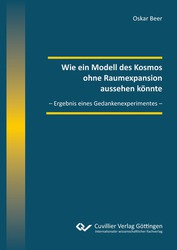| Departments | |
|---|---|
| Book Series (96) |
1381
|
| Nachhaltigkeit |
3
|
| Gesundheitswesen |
1
|
| Humanities |
2370
|
| Natural Sciences |
5408
|
| Mathematics | 229 |
| Informatics | 319 |
| Physics | 980 |
| Chemistry | 1364 |
| Geosciences | 131 |
| Human medicine | 243 |
| Stomatology | 10 |
| Veterinary medicine | 108 |
| Pharmacy | 147 |
| Biology | 835 |
| Biochemistry, molecular biology, gene technology | 121 |
| Biophysics | 25 |
| Domestic and nutritional science | 45 |
| Agricultural science | 1005 |
| Forest science | 201 |
| Horticultural science | 20 |
| Environmental research, ecology and landscape conservation | 148 |
| Engineering |
1795
|
| Common |
98
|
|
Leitlinien Unfallchirurgie
5. Auflage bestellen |
|
Advanced Search
Wie ein Modell des Kosmos ohne Raumexpansion aussehen könnte (English shop)
– Ergebnis eines Gedankenexperimentes –
Oskar Beer (Author)Preview
Extract, PDF (340 KB)
Table of Contents, PDF (46 KB)
How a Model of the Cosmos without Expansion of Space looks like
From the findings of a gedankenexperiment an alternative model of the cosmos has been derived, including predictions of velocities and actual distances from celestial bodies to the earth. These predictions are in exact match with the published data of the Extragalactic Cepheid Database of the Konkoly Observatory ⁵⁾ as well as of the Supernova Catalogue of Guillochon et al. ⁶⁾ (See below chapter 3) . The cosmic red shift is due to the Doppler effect and the model yields a theoretical value of the Hubble constant of 70,9 (km/(Mpc•s). The setup can be described by an equation of motion analogue to the second Friedmann differential equation. In first approximation the specific energy of baryonic and Dark Matter on the one side and the Energy , responsible for the expansion of the cosmos, on the other side is given by 0,33 to 0,67. Further on, the Copernican principle for the cosmos is fulfilled.
This model describes only effects related to the Big Bang. All later occurrences like later interactions , background radiation, genesis of galaxies, elements, black holes etc. remain unaffected.
| ISBN-13 (Hard Copy) | 9783736973985 |
| ISBN-13 (eBook) | 9783736963986 |
| Final Book Format | B5 |
| Language | German |
| Page Number | 42 |
| Lamination of Cover | matt |
| Edition | 1 |
| Publication Place | Göttingen |
| Publication Date | 2021-03-22 |
| General Categorization | Non-Fiction |
| Departments |
Physics
|
| Keywords | Gedankenexperiment and cosmic properties, properties of a Cosmos model without expansion of space, confirmation of Copernican principle, model explanation of decreasing luminosity with distance, perfect match of the model values with distances and velocities of cepheids and Supernovae Ia events, correct model value of the Hubble- Constant, cosmic red shift and Doppler red shift, luminosity distance, the model is a solution of the Second Friedmann Differential equation, Gedankenexperiment und kosmischen Daten, Eigenschaften eines Modells des Kosmos ohne Raumausdehnung, Erklärung des kopernikanischen Prinzips, Leuchtkraft -Minderung durch Entfernungsgeschwindigkeit, exakte Übereinstimmung der Modellvorhersagen sowohl mit den -Entfernungen zu Cepheiden als auch mit Entfernungen und Entfernungsgeschwindigkeiten von Supernovae Ia -Ereignissen, Leuchtkraftentfernung, kosmische Rotverschiebung und Doppler-Rotverschiebung, passender Modellwert der Hubble Konstanten, Lösung der Zweiten Friedmann Differentialgleichung, Kosmos, Raumexpansion, Himmelskörper, celestial bodies, Supernova, Observatorium, Galaxy, Galaxis, Dunkle Materie, Dark Matter, Urknall, Big Bang, Schwarze Löcher, black holes, Sterne, stars, Relativitätstheorie, relativity theory, Quanten, quantum theory, Milchstraße, Gravitation, elektromagnetische Kräfte, electromagnetic forces, Gravitationskonstante, gravitational constant, Masse, Anziehungskraft, Raumausdehnung, space expansion, Raumenergie, space energy, Lichtgeschwindigkeit, Physik, antigravitativ, Gravitationspotential, kinetische Energie, kinetic energy, Massepunkt, Kugelschale, earth, Erde, Rotationssymmetrie, rotational symmetry, Entfernung, distance, Dichte, Dichteschwankungen, density fluctuation, Dopplereffekt, doppler effect, Spektral-Wellenlänge, spectral wavelength, kosmische Standardkerzen, cosmic standard candles, Lichtlaufzeit, Astronomie, astronomy |








